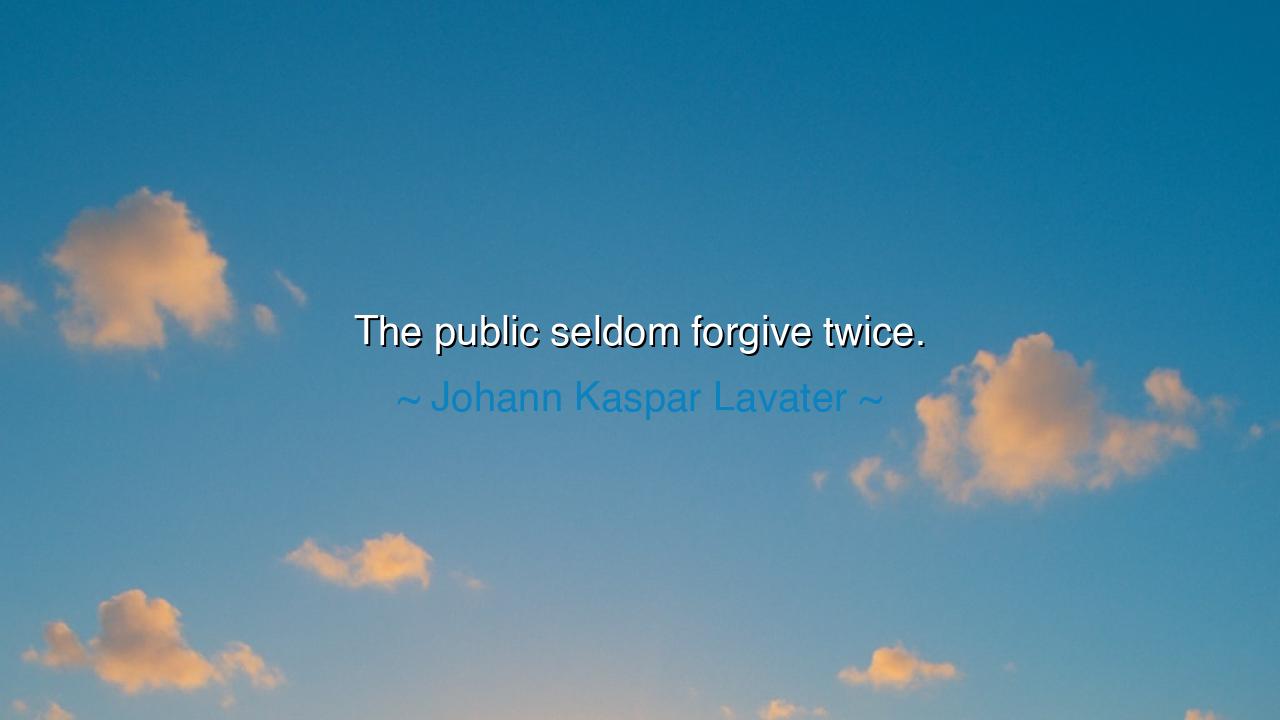
The public seldom forgive twice.






The words of Johann Kaspar Lavater carry the sharpness of truth, like a sword cutting through illusion: “The public seldom forgive twice.” Here he speaks of the fickle yet powerful force called public opinion. A man may stumble once and find mercy, for novelty and compassion may grant him a reprieve. But to falter again is to test the patience of the multitude, whose favor is fragile and whose memory of betrayal is long. Thus, the saying warns all who walk before the eyes of many: forgiveness is a rare treasure, and it seldom visits the same soul twice.
The ancients understood this well. In the amphitheaters of Rome, a gladiator spared once was seen as blessed by fortune, but should he falter again, the crowd demanded blood. The public does not love endlessly—it loves conditionally, and often cruelly. Lavater reminds us that the hearts of many are swayed not by mercy alone, but by the hunger for strength, integrity, and constancy. To err once may be human; to err twice is often judged unworthy of trust.
Consider the fate of Richard Nixon. When first accused in lesser scandals, the nation gave him another chance, forgiving his ambition and cunning for the sake of his leadership. But when Watergate came, the second blow was too great. The people turned their faces from him, and no apology could restore what was lost. His story stands as a living testament to Lavater’s words: the crowd forgave once, but not twice.
This teaching is not merely about rulers and kings but for all who dwell in the gaze of others. Friends, families, and communities may grant pardon once, but repeated wounds weaken the fabric of trust until it cannot be mended. Thus, Lavater speaks as a moral guide, urging us to guard our actions with care, to learn from our first failing, and not to tempt the patience of those who hold us in their judgment.
Let the generations remember: the mercy of the public is like a fragile glass—once cracked, it may be sealed, but if struck again, it shatters beyond repair. To walk with wisdom is to live so that forgiveness need not be asked a second time. For strength lies not in testing the limits of mercy, but in honoring the gift of trust and striving to never lose it again.






TTTran Thi Thanh Thao
It’s interesting to consider how often public figures and even regular people are given a second chance. Lavater’s quote makes me think about how much people are willing to forgive once they've been wronged. But in the age of cancel culture and instant judgment, is this view even applicable anymore? Are we too quick to dismiss people or do we still hold onto some sense of grace and forgiveness?
KHLe Thi Kim Han
Lavater’s observation feels a bit disheartening, especially when it comes to the idea of public forgiveness. Does it mean that people are too quick to judge or too unforgiving in their perceptions of others? Should society be more compassionate, allowing individuals room for growth and change, or is this an accurate reflection of how difficult it is to repair damaged reputations in the public eye?
MVMa Vote
This quote speaks to the unforgiving nature of public opinion. Once you make a mistake, the chance for redemption becomes limited. Is it fair to expect such high standards from the public, or should we be more understanding? Could this idea of 'seldom forgiving twice' be a reason why so many public figures struggle with scandals, feeling like they have to be perfect or risk everything?
Llinh
Lavater’s quote brings to mind the harsh reality of public perception. It suggests that once trust is broken, it’s difficult to regain. Is this always true? In today’s world of social media and public figures constantly being scrutinized, can someone truly be forgiven twice, or do the stakes feel higher than ever? Shouldn’t people be given a second chance to redeem themselves, or do mistakes have lasting consequences?